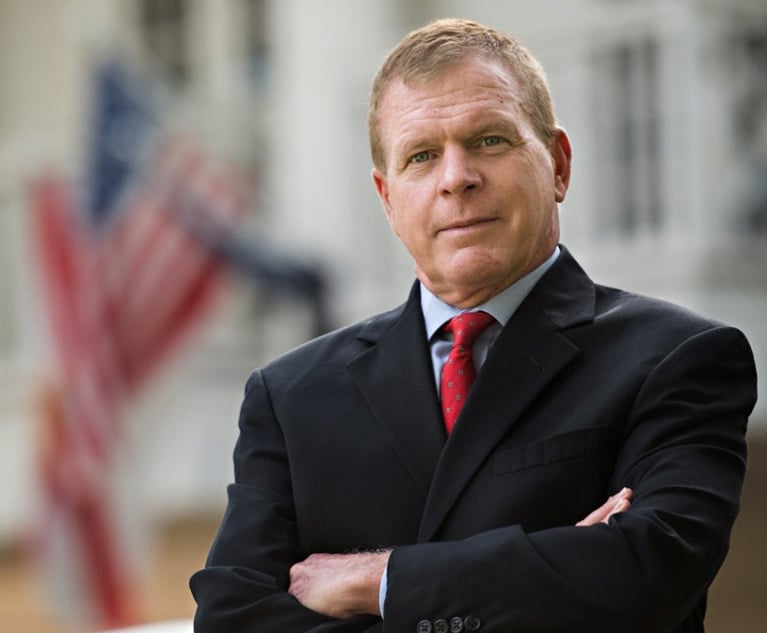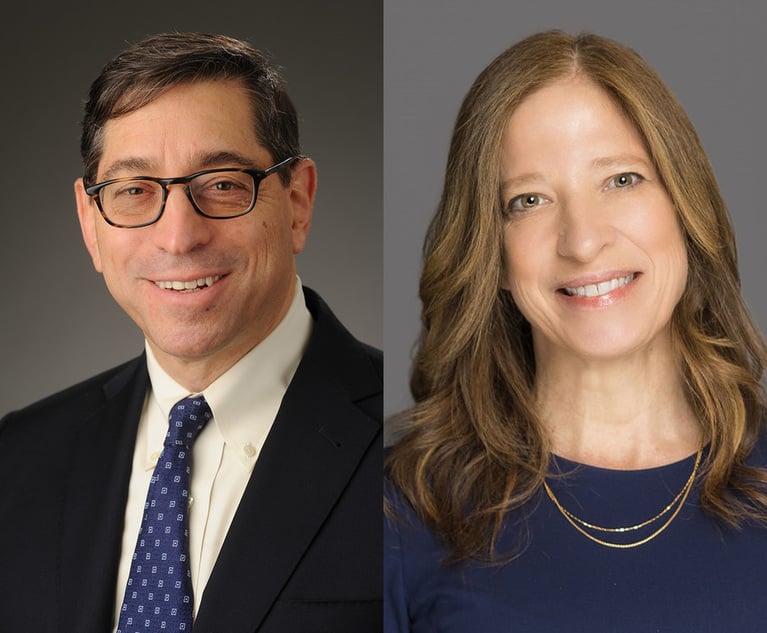Seven Changes in the Legal Job Market Impacting New Lawyers
Harvard Law School Assistant Dean of Career Services Mark Weber reflects on more than two decades of law school and legal practice developments.
March 30, 2018 at 06:40 PM
6 minute read

Lawyers beginning their legal careers in Big Law today earn more, specialize earlier and benefit from technology that affords them flexibility. I've spent 24 years working with students, alumni and employers. Here are seven notable changes impacting new lawyers today:
The Double-Edged Sword of Technology
A decade ago, new associates were given a Blackberry upon joining a firm. And they were excited about it! While there was an expectation that associates would be available beyond their work hours even then, now the expectation is truly 24-7. Young lawyers know they are entering a profession in which they will be always be on-call. Learning to juggle client and supervisor expectations while also having a life outside of work can be a big challenge. At the same time, advances in technology have made working remotely much more feasible. This often allows attorneys the flexibility to get their work done on their own terms, rather than always having to be physically at the office. Many firms, taking note that balance is important to young lawyers, have adopted flexible work policies and shared office spaces that accommodate flexible schedules.
Increased Salaries, Increased Debt
Starting salaries in Big Law have increased from $125,000 to $180,000 during the past decade. During the same time period, the average law school student debt load also has increased dramatically. As a result, the pressure to find a high-paying position straight out of school is higher than ever before. Young associates have the opportunity to make a lot of money early in their careers, but need to be extremely savvy about financial planning to determine how they will use that money to pay down their debt and live life.
A Focus on Increased Training and Exit Opportunities
Young lawyers entering private practice 10-15 years ago may not have been set on partnership, but most saw it as a viable option. Today, few associates expect to make partner, and many simply don't want to do so. Some intend only to stay at a large firm or in private practice to get training and pay off their law school debt. Whatever the reason, most entry level lawyers will change jobs within their first three years of practice, and most likely several times during their career. As a result, in their job search, law students tend to focus on how working for a particular employer will help them achieve their longer-term career goals. Firms, knowing that associates want not just a good place to work but also a good springboard for future opportunities, are responding by providing increased continuing education, career development and mentoring opportunities. Many firms now have in-house professional development staff to create and run these programs. Many firms have also created alumni clubs to help departing lawyers stay connected to the firm and to each other.
Unique Mentoring Opportunities
Because lawyers are living longer, working longer and less likely to retire early, more generations are working under one roof today than they did 10-15 years ago. As a result, lawyers working within a firm have very different work styles, expectations and technology comfort levels. While navigating this setting can be challenging, it also provides new lawyers unique mentoring opportunities across generational lines. Firms are taking advantage of these opportunities and recognizing the importance of mentoring and sponsorship to retention across the board, and specifically for the advancement of women and diverse attorneys.
Uncertainty around the Lawyer's Role
In the last decade, much of the work that used to be done by junior associates is now being outsourced through legal process outsourcing, and more work could soon be taken from junior associates due to advances in Artificial Intelligence. At the same time, clients do not want to pay to train junior associates, and expect firms to write off the time that used to form the bread and butter of a junior associate's billable hours. In-house legal departments, seeking to keep costs down, are more frequently in-sourcing work rather than relying on outside counsel. Taken together, this indicates that the future of legal practice is much cloudier than it was 10 years ago.
Increased Options for the JD Degree
While advances in technology provide some uncertainty to the future of the legal profession, they also result in more opportunities than ever for what a new graduate can do with a law degree. New lawyers are launching startups that marry their technological savvy with their legal knowledge, working in legal ops positions, and taking policy positions at technology companies. They are using their degrees in more ways than ever before in JD-advantage careers, and can specialize in practice areas that didn't exist years ago, such as Cybersecurity, Artificial Intelligence and Privacy Law.
A Focus on Mental Health & Balance
Lawyers, like society as a whole, are starting to have more conversations about mental health, life balance and inclusion. Recognizing that reducing stress is important both for the well-being of their employees and for their bottom line, firms now offer mindfulness programs, yoga classes and healthier eating options. They also offer enhanced benefits, like gender-neutral parental leave policies. Many have hired outside diversity consultants or in-house diversity officers to help guide the development of policies around diversity and inclusion, a change from ten to fifteen years ago, before many of these initiatives. With employers focused on creating a healthier and more inclusive environment for all employees, this is perhaps is the most meaningful change for new attorneys and for the profession.
Mark Weber is the Assistant Dean for Career Services at Harvard Law School and has more than 20 years of experience advising students and attorneys about their careers.
This content has been archived. It is available through our partners, LexisNexis® and Bloomberg Law.
To view this content, please continue to their sites.
Not a Lexis Subscriber?
Subscribe Now
Not a Bloomberg Law Subscriber?
Subscribe Now
NOT FOR REPRINT
© 2025 ALM Global, LLC, All Rights Reserved. Request academic re-use from www.copyright.com. All other uses, submit a request to [email protected]. For more information visit Asset & Logo Licensing.
You Might Like
View All

Restoring Antitrust: Returning to the Consumer Welfare Standard

New York Mayor Adams Attacks Fed Prosecutor's Independence, Appeals to Trump
5 minute readTrending Stories
- 1Big Law Firms Sheppard Mullin, Morgan Lewis and Baker Botts Add Partners in Houston
- 2Lack of Jurisdiction Dooms Child Sex Abuse Claim Against Archdiocese of Philadelphia, says NJ Supreme Court
- 3DC Lawsuits Seek to Prevent Mass Firings and Public Naming of FBI Agents
- 4Growth of California Firms Exceeded Expectations, Survey of Managing Partners Says
- 5Blank Rome Adds Life Sciences Trio From Reed Smith
Who Got The Work
J. Brugh Lower of Gibbons has entered an appearance for industrial equipment supplier Devco Corporation in a pending trademark infringement lawsuit. The suit, accusing the defendant of selling knock-off Graco products, was filed Dec. 18 in New Jersey District Court by Rivkin Radler on behalf of Graco Inc. and Graco Minnesota. The case, assigned to U.S. District Judge Zahid N. Quraishi, is 3:24-cv-11294, Graco Inc. et al v. Devco Corporation.
Who Got The Work
Rebecca Maller-Stein and Kent A. Yalowitz of Arnold & Porter Kaye Scholer have entered their appearances for Hanaco Venture Capital and its executives, Lior Prosor and David Frankel, in a pending securities lawsuit. The action, filed on Dec. 24 in New York Southern District Court by Zell, Aron & Co. on behalf of Goldeneye Advisors, accuses the defendants of negligently and fraudulently managing the plaintiff's $1 million investment. The case, assigned to U.S. District Judge Vernon S. Broderick, is 1:24-cv-09918, Goldeneye Advisors, LLC v. Hanaco Venture Capital, Ltd. et al.
Who Got The Work
Attorneys from A&O Shearman has stepped in as defense counsel for Toronto-Dominion Bank and other defendants in a pending securities class action. The suit, filed Dec. 11 in New York Southern District Court by Bleichmar Fonti & Auld, accuses the defendants of concealing the bank's 'pervasive' deficiencies in regards to its compliance with the Bank Secrecy Act and the quality of its anti-money laundering controls. The case, assigned to U.S. District Judge Arun Subramanian, is 1:24-cv-09445, Gonzalez v. The Toronto-Dominion Bank et al.
Who Got The Work
Crown Castle International, a Pennsylvania company providing shared communications infrastructure, has turned to Luke D. Wolf of Gordon Rees Scully Mansukhani to fend off a pending breach-of-contract lawsuit. The court action, filed Nov. 25 in Michigan Eastern District Court by Hooper Hathaway PC on behalf of The Town Residences LLC, accuses Crown Castle of failing to transfer approximately $30,000 in utility payments from T-Mobile in breach of a roof-top lease and assignment agreement. The case, assigned to U.S. District Judge Susan K. Declercq, is 2:24-cv-13131, The Town Residences LLC v. T-Mobile US, Inc. et al.
Who Got The Work
Wilfred P. Coronato and Daniel M. Schwartz of McCarter & English have stepped in as defense counsel to Electrolux Home Products Inc. in a pending product liability lawsuit. The court action, filed Nov. 26 in New York Eastern District Court by Poulos Lopiccolo PC and Nagel Rice LLP on behalf of David Stern, alleges that the defendant's refrigerators’ drawers and shelving repeatedly break and fall apart within months after purchase. The case, assigned to U.S. District Judge Joan M. Azrack, is 2:24-cv-08204, Stern v. Electrolux Home Products, Inc.
Featured Firms
Law Offices of Gary Martin Hays & Associates, P.C.
(470) 294-1674
Law Offices of Mark E. Salomone
(857) 444-6468
Smith & Hassler
(713) 739-1250









